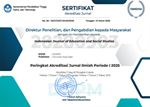Aisyah, E. N., & Utamimah, S. (2025). Implementing Project-Based Learning with Loose Parts in Early Childhood Education: A Qualitative Descriptive Study. Golden Age: Jurnal Ilmiah Tumbuh Kembang Anak Usia Dini, 10(1), 71-84. https://doi.org/10.14421/jga.2025.101-06
Alfaridli, M. A., Muslimah, A., Iqna'a, F. J., & Baharun, H. (2024). Educational Communication Strategy To Improve Competitiveness In The Era Of Technological Change And Globalization. Journal of Education Management Research, 2(2), 94-107.
Alzahrani, A. M., Alharbi, R., & Alzahrani, R. (2022). Self-regulated learning and academic achievement among university students: The mediating role of learning motivation. International Journal of Education and Research, 10(3), 45-57.
Bandura, A. (1986). Social foundations of thought and action: A social cognitive theory. Englewood Cliffs, NJ: Prentice-Hall.
DeVito, J. A. (2013). The interpersonal communication book (13th ed.). Boston, MA: Pearson Education.
Fanani, A. A., & Hidayah, F. (2024). How to Enhance Islamic Education Learning Outcomes through an Integrated Literacy Approach in Madrasah? A Case Study. Jurnal Keislaman, 7(2), 286-301. https://doi.org/10.54298/jk.v7i2.242
Fatmasari, R., Windiyani, T., & Putri, D. F. (2025). Artificial Intelligence as a Tool to Improve the Quality of Job-Ready Graduate Skills in Higher Education. 2025 IEEE International Conference on Industry 4.0, Artificial Intelligence, and Communications Technology (IAICT), 129-136. https://doi.org/10.1109/IAICT65714.2025.11101572
Gojali, I., Hidayah, F., Aniati, A., & Baharun, H. (2024). Mindfulness for Teachers: Strategies to Manage Stress and Improve Learning Quality in Madrasah. Urwatul Wutsqo: Jurnal Studi Kependidikan Dan Keislaman, 13(2), 190-203. https://doi.org/10.54437/urwatulwutsqo.v13i2.1717
Hefniy, H., Azizah, N., Zahro, F., Baharun, H., Tohet, M., & Widat, F. (2025). Assistance in the Use of YouTube Kids as a Creative Learning Resource for Educators and Education Staff. Communautaire: Journal of Community Service, 4(1), 14-24.
Hidayah, N. (2023). Pengaruh komunikasi interpersonal orang tua terhadap prokrastinasi akademik siswa SMA Negeri 2 Yogyakarta. Jurnal Psikologi Pendidikan dan Konseling, 9(2), 121-130.
Khosi'in, I., Wiarsih, N., Faishol, R., & Baharun, H. (2024). Strategies of Islamic Education Teachers Based on Local Wisdom in Enhancing Learning Quality at Madrasah: Strategi Guru Pendidikan Agama Islam Berbasis Kearifan Lokal dalam Meningkatkan Kualitas Pembelajaran di Madrasah. TA'LIMUNA: Jurnal Pendidikan Islam, 13(2), 98-112.
Mannan, A. F., & Shulhani, R. (2024). Conflict in Schools: How Effective Communication Can Address Bullying Problems in Educational Institutions. TIME: Transformation in Islamic Management and Education Journal, 1(2), 61-68. https://doi.org/10.53889/jaiem.v2i2.561
Mundiri, A., Munawwaroh, I., Hadi, M. I., Baharun, H., Shudiq, W. J., & Maulidy, A. (2025). Artificial Intelligence
(AI) Innovation in Education: From Data-Driven Learning to Automated Teaching. 2025 IEEE International Conference on Industry 4.0, Artificial Intelligence, and Communications Technology (IAICT), 173-180. https://doi.org/10.1109/IAICT65714.2025.11100623
Nurhayati, S. (2023). Self-regulated learning and its impact on academic procrastination among students of Islamic higher education. Journal of Educational Psychology and Counseling, 5(1), 33-42. https://doi.org/10.18196/jiee.v1i1.8
Rahmi, D., & Safitri, Y. (2022). Psychological capital and self-regulated learning as predictors of academic procrastination. Indonesian Journal of Educational Research, 4(2), 67-76.
Aisyah, E. N., & Utamimah, S. (2025). Implementing Project-Based Learning with Loose Parts in Early Childhood Education: A Qualitative Descriptive Study. Golden Age: Jurnal Ilmiah Tumbuh Kembang Anak Usia Dini, 10(1), 71-84. https://doi.org/10.14421/jga.2025.101-06
Alfaridli, M. A., Muslimah, A., Iqna'a, F. J., & Baharun, H. (2024). Educational Communication Strategy To Improve Competitiveness In The Era Of Technological Change And Globalization. Journal of Education Management Research, 2(2), 94-107.
Fanani, A. A., & Hidayah, F. (2024). How to Enhance Islamic Education Learning Outcomes through an Integrated Literacy Approach in Madrasah? A Case Study. Jurnal Keislaman, 7(2), 286-301. https://doi.org/10.54298/jk.v7i2.242
Fatmasari, R., Windiyani, T., & Putri, D. F. (2025). Artificial Intelligence as a Tool to Improve the Quality of Job-Ready Graduate Skills in Higher Education. 2025 IEEE International Conference on Industry 4.0, Artificial Intelligence, and Communications Technology (IAICT), 129-136. https://doi.org/10.1109/IAICT65714.2025.11101572.
Gojali, I., Hidayah, F., Aniati, A., & Baharun, H. (2024). Mindfulness for Teachers: Strategies to Manage Stress and Improve Learning Quality in Madrasah. Urwatul Wutsqo: Jurnal Studi Kependidikan Dan Keislaman, 13(2), 190-203. https://doi.org/10.54437/urwatulwutsqo.v13i2.1717
Hefniy, H., Azizah, N., Zahro, F., Baharun, H., Tohet, M., & Widat, F. (2025). Assistance in the Use of YouTube Kids as a Creative Learning Resource for Educators and Education Staff. Communautaire: Journal of Community Service, 4(1), 14-24.
Khosi'in, I., Wiarsih, N., Faishol, R., & Baharun, H. (2024). Strategies of Islamic Education Teachers Based on Local Wisdom in Enhancing Learning Quality at Madrasah: Strategi Guru Pendidikan Agama Islam Berbasis Kearifan Lokal dalam Meningkatkan Kualitas Pembelajaran di Madrasah. TA'LIMUNA: Jurnal Pendidikan Islam, 13(2), 98-112.
Mannan, A. F., & Shulhani, R. (2024). Conflict in Schools: How Effective Communication Can Address Bullying Problems in Educational Institutions. TIME: Transformation in Islamic Management and Education Journal, 1(2), 61-68. https://doi.org/10.53889/jaiem.v2i2.561
Mundiri, A., Munawwaroh, I., Hadi, M. I., Baharun, H., Shudiq, W. J., & Maulidy, A. (2025). Artificial Intelligence
(AI) Innovation in Education: From Data-Driven Learning to Automated Teaching. 2025 IEEE International Conference on Industry 4.0, Artificial Intelligence, and Communications Technology (IAICT), 173-180. https://doi.org/10.1109/IAICT65714.2025.11100623
Rozi, F., & Badriyah, N. (2025). Elementary Madrasah Teachers' Perceptions of the Seamless Learning Model. JETech: Journal of Education and Technology, 1(1), 1-9.
Safuan, A., Fanani, A. A., Hidayah, F., Mashuri, I., & Baharun, H. (2024). Communication Shapes Students' Character Through The Values Of Ahlussunah Wal Jamaah In Madrasah. Al-Tsiqoh: Jurnal Ekonomi Dan Dakwah Islam, 9(2), 37-51. https://doi.org/10.31538/altsiq.v9i2.5547
Sain, Z. H., Huda, S., Manshur, U., & Habibu, M. L. (2024). Enhancing Islamic Religious Education through IT-Based Learning: A Qualitative Study.
Veronika, E., & Zaini, A. W. (2024). Overcoming Academic Challenges: The Role of Self-Efficacy in Reducing Student Burnout in PAI Learning. Journal of Social Studies and Education, 1(2), 73-86. https://doi.org/10.61987/jsse.v1i2.517
 (Universitas Negeri Padang)
(Universitas Negeri Padang) 



